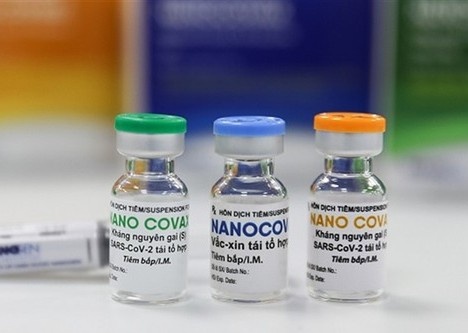German know-how improving healthcare
 |
| Vaccine Nano Covax. Photo: VNA |
The National Ethics Committee in Biomedical Research under the Ministry of Health on September 19 approved the third phase clinical trial results of home-grown COVID-19 vaccine Nanocovax, taking it a step closer to mass production.
The vaccine is developed by Vietnam’s Nanogen Pharmaceutical Biotechnology JSC which has cooperated with Siemens Healthineers to use its SARS-CoV-2 IgG antibody test during the clinical trials.
This is a first-of-its-kind collaboration for Siemens Healthineers in the Asia-Pacific to facilitate the quantitative measurement of SARS-CoV-2 IgG antibodies in vaccinated subjects and help assess the level of potentially protective immune responses induced by Nanocovax.
Siemens is just one of the many German companies supporting Vietnam’s COVID-19 fight. The others include powerful medical equipment companies like Dräger, Mövenstein, and B Braun.
At a meeting with National Assembly Chairman Vuong Dinh Hue on September 11 in Helsinki, Christian Bruch, president and CEO of Siemens Energy AG, stated that his company had worked with the German government to promote the supply of medical equipment and vaccines to Vietnam, and is doing its utmost to support Vietnam’s access to vaccines and medical equipment.
Last year, Siemens Healthineers partnered with Binh Minh Co., Ltd. and the Vietnam Respiratory Society to support Danang Hospital with a RAPIDPoint 500 Blood Gas Analyzer to support COVID-19 treatment.
Elsewhere, Bad Schmiedeberg Kur company had a working session with Military Hospital 175 in June to discuss potential healthcare cooperation, where managing director Deddo Lehmann expressed hope that the two sides would step up collaboration in specific projects.
Besides corporate cooperation, the German government has been supporting Vietnam with COVID-19 vaccines, donating 2.5 million doses of AstraZeneca in early September, and the German Federal Ministry of Health also pledged to deliver an additional 850,000 doses via the COVAX Facility.
At the handover in Vietnam, German Ambassador Guido Hildner said, “I am very happy about this delivery of German vaccines. Germany stands with Vietnam in fighting and overcoming the pandemic. We can only defeat it if it is brought under control everywhere. Therefore, Germany and the European Union support the COVAX vaccination campaign for fair and transparent access to vaccines worldwide.”
Germany has also announced that it would gift Vietnam with a medical equipment package of 75 ventilators, 15 medical monitors, and 20,000 oxygen meters. In addition, Vietnam and Germany are also working on technology transfer and cooperation between pharmaceutical firms to produce vaccines and other medicines.
The German government is supporting global efforts to fight the pandemic to the tune of €2.2 billion ($2.57 billion). Most of this sum was donated to COVAX to procure and finance vaccines for developing countries. Thus far, Vietnam has received several million doses of vaccines via the facility, greatly contributing to the country’s vaccination campaign.
According to Nguyen Minh Vu, Vietnamese Ambassador to Germany, these donations and support reflect strengthening bilateral ties. While earlier, Germany mainly donated vaccines via the COVAX facility, it has recently adjusted its policy to make direct donations to some countries outside the EU.
With 3.35 million doses of vaccines, Germany is the second-biggest donor of COVID-19 vaccines for Vietnam and the biggest one in the EU bloc. This also marks the highest number of vaccines in bilateral assistance that Germany offers to a country outside the EU.
Healthcare has been one of the priority areas in German-Vietnamese cooperation over the years. Germany has carried out many projects to support Vietnam in improving healthcare infrastructure, provide medical equipment for hospitals, treat medical waste, and provide telemedicine, among others.
Germany is one of the biggest and most developed medical markets in Europe with medical spending in 2017 reaching €374 billion ($437.3 billion). It is also one of the world’s largest suppliers and exporters of medical products and services.
Meanwhile, Vietnam’s fast-paced economic development and rising middle class moving forward will continue to increase healthcare demand, providing ample grounds for medical cooperation between Vietnam and Germany, bringing more business opportunities.
This will be reinforced by the EU-Vietnam Free Trade Agreement and the accompanying investment protection agreement, according to Ambassador Vu, which will open up the Vietnamese market entry for EU businesses, allowing them to join public procurement bids, including in healthcare.
What the stars mean:
★ Poor ★ ★ Promising ★★★ Good ★★★★ Very good ★★★★★ Exceptional
Themes: Healthcare Platform
- Opella and Long Chau join forces to enhance digestive and bone health
- Hanoi intensifies airport monitoring amid Nipah disease risks
- Cosmetics rules set for overhaul under draft decree
- Policy obstacles being addressed in drug licensing and renewal
- Sanofi, Long Chau Pharmacy relaunch medicine blister pack collection initiative
Related Contents
Latest News
More News
- Resilience as new benchmark for smarter infrastructure (February 19, 2026 | 20:35)
- A golden time to shine within ASEAN (February 19, 2026 | 20:22)
- Vietnam’s pivotal year for advancing sustainability (February 19, 2026 | 08:44)
- Strengthening the core role of industry and trade (February 19, 2026 | 08:35)
- Future orientations for healthcare improvements (February 19, 2026 | 08:29)
- Infrastructure orientations suitable for a new chapter (February 19, 2026 | 08:15)
- Innovation breakthroughs that can elevate the nation (February 19, 2026 | 08:08)
- ABB Robotics hosts SOMA Value Provider Conference in Vietnam (February 19, 2026 | 08:00)
- Entire financial sector steps firmly into a new spring (February 17, 2026 | 13:40)
- Digital security fundamental for better and faster decision-making (February 13, 2026 | 10:50)

 Tag:
Tag:
















 Mobile Version
Mobile Version